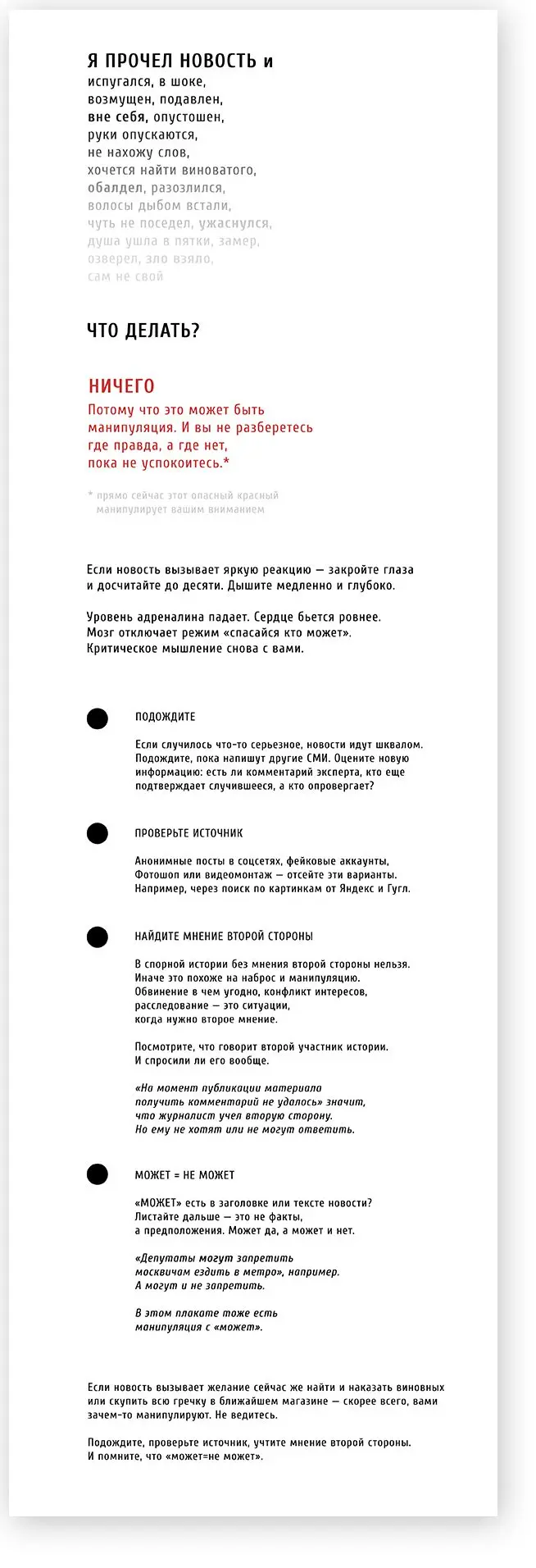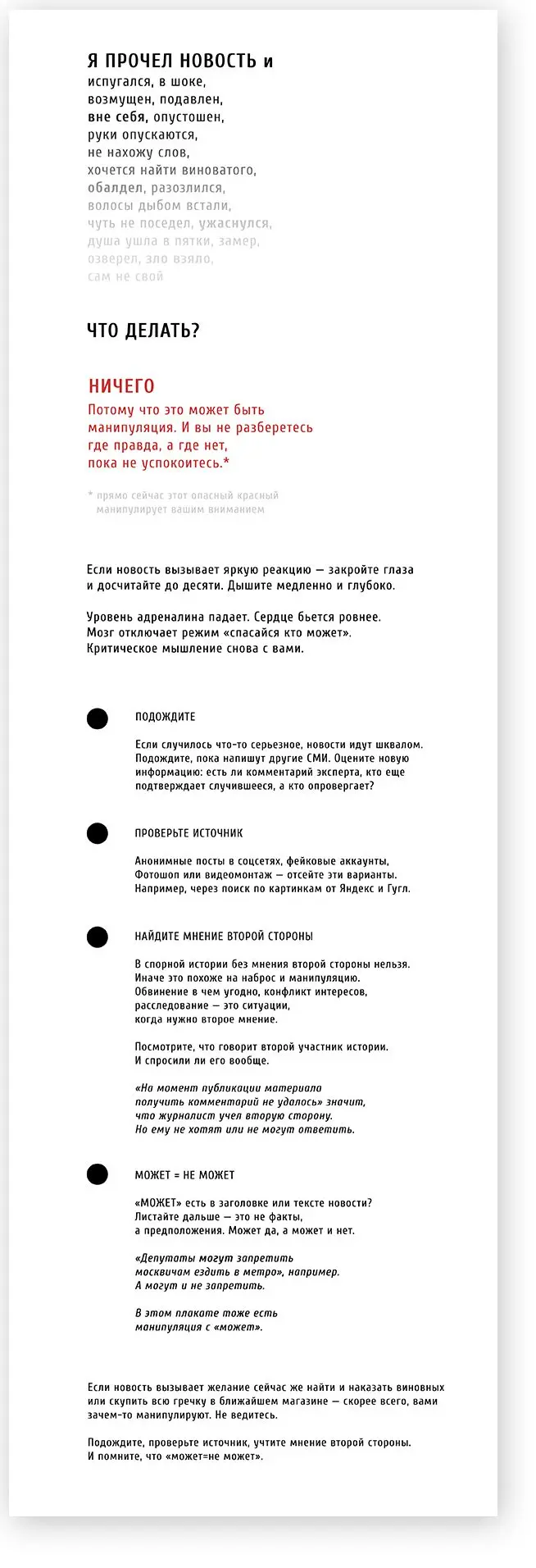Contents
News feed, social networks, chats with friends – disturbing news penetrates all sources of information. We asked a psychologist how to protect yourself from the flow of news and why it is as important as the habit of washing your hands often
What is the problem
Coronavirus, economics, geopolitics: everyone is following the news and talking about it. But in addition to official sources, there is also fake news, unverified information, reactions of individuals on social networks and discussions in chats with friends.
The current situation has shown: technologies for communications are developing very quickly, but the ethics of responsibility for information and the ability of the human psyche to perceive it do not change so quickly. One of the key skills of the future is the ability to filter information and not let the flow of news influence our state, decisions and motivation.
Konstantin Pochtenny, business coach, cognitive behavioral psychologist:
“It’s normal to be anxious now – on the contrary, it would be strange if the news did not cause anxiety. I see several types of behavior in this situation. Someone worries about everything at once, catastrophizes. Someone devalues, denies the problem itself – this is also an attempt to cope with anxiety. Everyone is affected by the information field, and the very word “coronavirus” is alarming.”
People read the news because they are anxious about uncertainty. Scrolling through the feed of social networks and news sites creates the illusion of control over the situation. Therefore, it is so difficult to stop – there is a fear of missing something important, not having time to react.
If you absorb all this flow “as is”, you can harm yourself. There will be problems with appetite and sleep, irritability or apathy, high blood pressure, stress, feelings of despair, panic attacks. It also increases the likelihood of quarreling with family, friends and acquaintances while you are discussing the agenda and finding out who is right.
Everyone has their own critical mass of information, but in the conditions of uncontrolled consumption of disturbing news, the limit will come faster. Here’s what you can do to protect yourself.
Dose Information
Set aside 15-30 minutes a day to read and discuss the news. The most inappropriate interval is before bedtime, it is better to choose a time in the middle of the day. You cannot limit the flow of information, but you can choose when you connect to it.
Constantine the Honored:
“You can’t completely avoid the news flow. Otherwise, the unknown will also create anxiety. We need dosed awareness. It is better to reduce information noise – for example, up to half an hour a day.
You can try to limit not only the reading of the news, but the process of anxiety itself. Set aside 20 minutes a day to be immersed in this emotion. If you want to worry at another moment, remind yourself that there is a special time for this.
Negotiate with household
Constant conversations at home about what is happening around also cause a feeling of anxiety. Decide with your loved ones when and how much time you will devote to discussing new information. For example, no more than 20 minutes after breakfast.
If you’re quarantined with the elderly, explain to them why it’s not healthy to talk about problems all day long. Stress lowers the immune system.
Choose trusted sources
In the case of the pandemic, for example, these were the websites of the WHO and the Ministry of Health, resources with official statistics and medical recommendations. Reading official news is boring because it does not appeal to emotions, but to logic, and only reports facts. But it is safer for the psyche than the emotional posts of friends on social networks. The emotional response of the other person may be different from yours. Remember this if someone’s opinion about a situation revolts you and you want to argue.
Constantine the Honored:
“If we are all the time in the news feed, then in our own there will be a feeling that everything has stopped, life has stopped. Therefore, it is important to free yourself a vital, temporary and mental space for everything else. When we do that, we can do something else.”
What to ask yourself to be less anxious when reading the news:
- “How does this affect me and my family?” If the news is about an abstract threat or about something not directly related to you, you can safely scroll through the feed.
- “Can I do something about it?” If you cannot influence the situation in any way, there is no point in worrying about it. It is better to direct efforts to available actions.
- “Is this news at the level of the world, country, region or city?” It is better to focus on local news, as they directly concern us. Global news is also important, but don’t devote all your attention to it.
- “Is this a forecast, a hypothesis, an opinion, someone’s analytics?” If so, scroll on, because it doesn’t mean anything yet. The opinion of an individual expert, even the most competent one, may turn out to be erroneous. And analytical graphs can be based on incomplete or incorrect data.
Practice Delayed Reading
If you want to read another publication with a big headline, bookmark this page to read later. Perhaps by then the desire will be gone.
Get in the habit of reading news digests and evening summaries. It will turn out that someone has done the main work for you – they have chosen the most important thing from the agenda. Minor news creates unnecessary informational noise, and reaction to them wastes your energy in vain.
Think of something to do
When you’ve managed to free up some time from reading the news, choose a suitable replacement. You can arrange with friends and arrange a movie or concert. It is also good to use the possibilities of video communication: cook a cake together, play a sea battle, read a book and discuss it. It can also be any creative activity that you like.
Constantine the Honored:
“Creativity is a very resourceful occupation for a person. It enables us to cope with everyday activities and keeps us strong. Being creative does not allow you to plunge into rumination – mental chewing gum when we twist disturbing thoughts in our heads that frighten us.
It is worth setting a realistic goal by a certain time. For example, before the end of the month, learn a new skill or sort out your wardrobe. It helps to get rid of the feeling that nothing is changing. Achievement activities are a good way to regain a sense of control over your own life.


What else is important
- Tolerance for discomfort. Serious changes for some time become part of our lives. If you accept this fact, then it will be easier to endure the rejection of your usual lifestyle. In normal times, planning and meeting deadlines were the norm. It is now the norm to change plans.
- Physical and mental activity. Any online classes, daily exercises or a simple warm-up will do. It is also important to take care of your eyesight. For example, do the exercise with a dot on a window glass when you need to focus on objects near and far from you.
- Schedule. Keep the usual structure of the day. Changes in regimen or living on a flexible schedule can increase anxiety.
- Preservation of social contacts. Even with constant contact within the family, social activity may not be enough. You can restore old contacts, contact those with whom you have not been able to communicate for a long time due to the daily routine.










